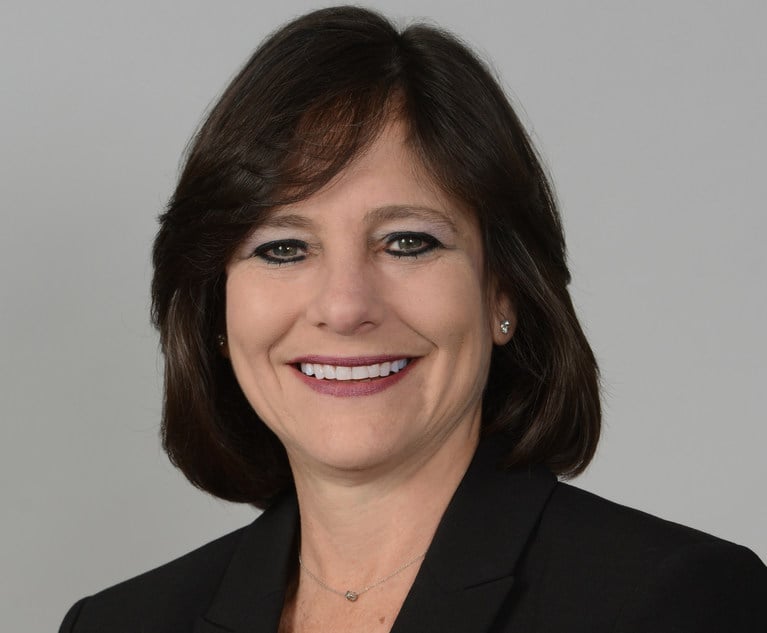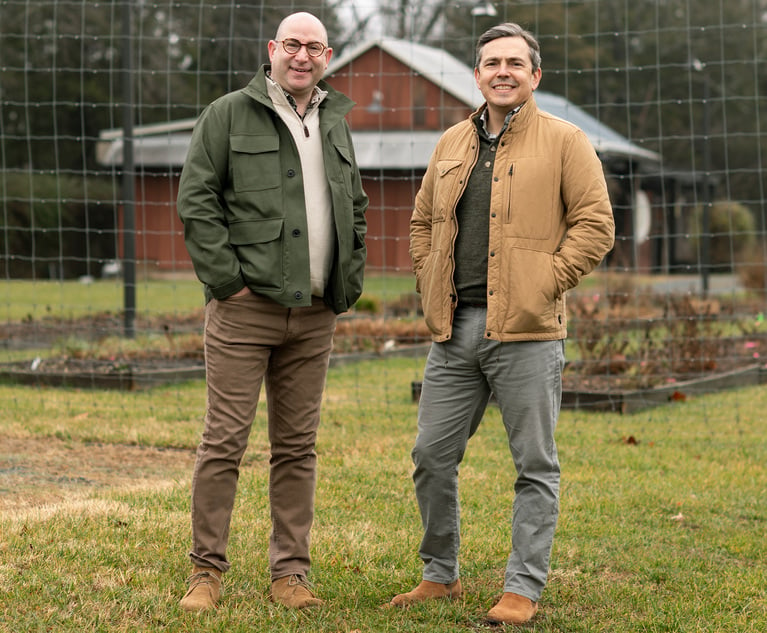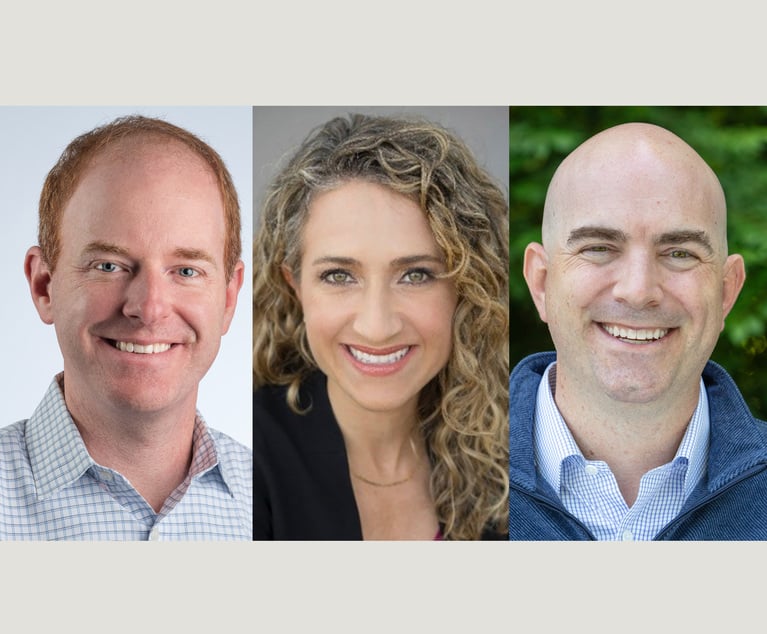Daily Dicta: New Civil Court Filings Have Plummeted—But a Surge Is (Almost) Sure to Follow
Now that the economy is in the toilet, does this mean litigators will get their moment in the sun while their corporate and M&A colleagues sit idle? Not exactly. At least not yet.
April 23, 2020 at 12:36 AM
5 minute read
 Conventional wisdom holds that litigation is counter-cyclical. So now that the economy is in the toilet, does this mean litigators will get their moment in the sun while their corporate and M&A colleagues sit idle?
Conventional wisdom holds that litigation is counter-cyclical. So now that the economy is in the toilet, does this mean litigators will get their moment in the sun while their corporate and M&A colleagues sit idle?
Perhaps—but not quite yet.
My colleagues at ALM's newest project, Legal Radar, (which if you have not checked out, you should do so right away) have been crunching data, looking at new civil filings in federal courts across the country.
Here's what they found: "Over the four weeks ending April 12, new civil cases across all U.S. district courts slumped more than 22 percent compared with the same four weeks last year."
 Oof.
Oof.
They didn't count all civil cases—the tally excludes non-commercial matters such as social security claims and immigration cases, and also doesn't count redundant mass tort filings. And of course, correlation is not causation. Moreover, it's likely the drop reflects court closures, distracted lawyers working from home and clients facing an array of issues more pressing than litigation.
Still, the numbers tell us something about the current state of the bread-and-butter litigation practices at many law firms—securities, IP, insurance, labor and employment, contracts, ADA accessibility, personal injury and foreclosures.
Some practice areas are faring better than others. New foreclosure actions, for example, plummeted the most, with a 68% drop. But that's hardly surprising, since the Coronavirus Aid, Relief, and Economic Security (CARES) Act, which was passed in late March, put a moratorium on foreclosures for homeowners with federally backed mortgages (about half of all mortgages).
Also, even the most rapacious lender might think twice about taking someone's home at a time when most people are ordered to shelter in place. Or one would hope.
Personal injury cases are also way down, falling 47%—perhaps because so many non-critical health care matters are on hold.
Before filing a case, accident victims need to receive all of the doctor-recommended treatment, notes Orlando personal injury lawyer Tina Willis. "Unfortunately, fear of this virus, as a reason for not receiving medical treatment after an accident, will not change the fact that the treatment is needed to maximize case value … because we can't settle a case, or file a lawsuit, until treatment is substantially finished."
ADA accessibility cases are also down 24%. Many of those cases are based on people suing businesses for failing to meet accessibility standards. But now that so many businesses are closed, there are fewer opportunities to find violations. (Also, c'mon. Is this really a good time to sue a shuttered restaurant or shop that's on the verge of going under as-is?)
Copyright and trademark suits also showed a steep decline.
New contract suits to date are down slightly, though lawyers fully expect this to change.
As my colleague Angela Morris reported last month, "Disputes are already surfacing as U.S. companies get notices that their China-based vendors of parts or materials can't honor contracts because of the 'force majeure' event… [A]t this point, most parties just want to manage the problem and get their operations back on line. However, at some point, companies will begin asking who is responsible for the costs. If they can't agree on a resolution, that's when they file lawsuits."
A few practice areas are already seeing a bump in new filings compared to 2019, including labor and employment. Cases are up 4%, and many lawyers anticipate further growth.
"Conferring with my L&E and employee benefit partners, there is a general consensus that there will be many employee class actions," writes Kent Schmidt, a partner at Dorsey & Whitney, in his Left Coast Law blog. "One reason for the delay in employment case filings is that the operative facts relating to these claims are still unfolding in real time as employees are being required to work remotely or perform essential services under extraordinary conditions, encountering risks never contemplated."
Also up: Insurance cases, with 4.5% increase to date—a tally that's also almost sure to rise. For example, McKool Smith insurance recovery head Robin Cohen last week told me that she's already been contacted by more than 100 clients across a range of industries who have asked her to review their policies and advise on coverage.
Cohen noted that insurers typically require policy holders to follow their claims handling process, and to provide proof of their losses (still a moving target), which means many suits are still weeks or months away.
Securities litigation has also spiked, though it's a fairly small universe of cases.
To date, companies including Norwegian Cruise Lines, Inovio Pharmaceuticals and Zoom have been hit with shareholder class actions related to the coronavirus. Other suits
Lawyers expect more to come.
COVID-19 "is the perfect recipe for 'event-driven' securities class action lawsuits," according to Troutman Sanders. "We expect to see a wave of securities class action filings following the 'event' of the COVID-19 pandemic and related market losses."
This content has been archived. It is available through our partners, LexisNexis® and Bloomberg Law.
To view this content, please continue to their sites.
Not a Lexis Subscriber?
Subscribe Now
Not a Bloomberg Law Subscriber?
Subscribe Now
NOT FOR REPRINT
© 2025 ALM Global, LLC, All Rights Reserved. Request academic re-use from www.copyright.com. All other uses, submit a request to [email protected]. For more information visit Asset & Logo Licensing.
You Might Like
View All
Litigation Leaders: Greenspoon Marder’s Beth-Ann Krimsky on What Makes Her Team ‘Prepared, Compassionate and Wicked Smart’

Why the Founders of IP Boutique Fisch Sigler Are Stepping Away From the Law and Starting an AI Venture
Law Firms Mentioned
Trending Stories
- 1'Pull Back the Curtain': Ex-NFL Players Seek Discovery in Lawsuit Over League's Disability Plan
- 2Tensions Run High at Final Hearing Before Manhattan Congestion Pricing Takes Effect
- 3Improper Removal to Fed. Court Leads to $100K Bill for Blue Cross Blue Shield
- 4Michael Halpern, Beloved Key West Attorney, Dies at 72
- 5Burr & Forman, Smith Gambrell & Russell Promote More to Partner This Year
Who Got The Work
Michael G. Bongiorno, Andrew Scott Dulberg and Elizabeth E. Driscoll from Wilmer Cutler Pickering Hale and Dorr have stepped in to represent Symbotic Inc., an A.I.-enabled technology platform that focuses on increasing supply chain efficiency, and other defendants in a pending shareholder derivative lawsuit. The case, filed Oct. 2 in Massachusetts District Court by the Brown Law Firm on behalf of Stephen Austen, accuses certain officers and directors of misleading investors in regard to Symbotic's potential for margin growth by failing to disclose that the company was not equipped to timely deploy its systems or manage expenses through project delays. The case, assigned to U.S. District Judge Nathaniel M. Gorton, is 1:24-cv-12522, Austen v. Cohen et al.
Who Got The Work
Edmund Polubinski and Marie Killmond of Davis Polk & Wardwell have entered appearances for data platform software development company MongoDB and other defendants in a pending shareholder derivative lawsuit. The action, filed Oct. 7 in New York Southern District Court by the Brown Law Firm, accuses the company's directors and/or officers of falsely expressing confidence in the company’s restructuring of its sales incentive plan and downplaying the severity of decreases in its upfront commitments. The case is 1:24-cv-07594, Roy v. Ittycheria et al.
Who Got The Work
Amy O. Bruchs and Kurt F. Ellison of Michael Best & Friedrich have entered appearances for Epic Systems Corp. in a pending employment discrimination lawsuit. The suit was filed Sept. 7 in Wisconsin Western District Court by Levine Eisberner LLC and Siri & Glimstad on behalf of a project manager who claims that he was wrongfully terminated after applying for a religious exemption to the defendant's COVID-19 vaccine mandate. The case, assigned to U.S. Magistrate Judge Anita Marie Boor, is 3:24-cv-00630, Secker, Nathan v. Epic Systems Corporation.
Who Got The Work
David X. Sullivan, Thomas J. Finn and Gregory A. Hall from McCarter & English have entered appearances for Sunrun Installation Services in a pending civil rights lawsuit. The complaint was filed Sept. 4 in Connecticut District Court by attorney Robert M. Berke on behalf of former employee George Edward Steins, who was arrested and charged with employing an unregistered home improvement salesperson. The complaint alleges that had Sunrun informed the Connecticut Department of Consumer Protection that the plaintiff's employment had ended in 2017 and that he no longer held Sunrun's home improvement contractor license, he would not have been hit with charges, which were dismissed in May 2024. The case, assigned to U.S. District Judge Jeffrey A. Meyer, is 3:24-cv-01423, Steins v. Sunrun, Inc. et al.
Who Got The Work
Greenberg Traurig shareholder Joshua L. Raskin has entered an appearance for boohoo.com UK Ltd. in a pending patent infringement lawsuit. The suit, filed Sept. 3 in Texas Eastern District Court by Rozier Hardt McDonough on behalf of Alto Dynamics, asserts five patents related to an online shopping platform. The case, assigned to U.S. District Judge Rodney Gilstrap, is 2:24-cv-00719, Alto Dynamics, LLC v. boohoo.com UK Limited.
Featured Firms
Law Offices of Gary Martin Hays & Associates, P.C.
(470) 294-1674
Law Offices of Mark E. Salomone
(857) 444-6468
Smith & Hassler
(713) 739-1250








